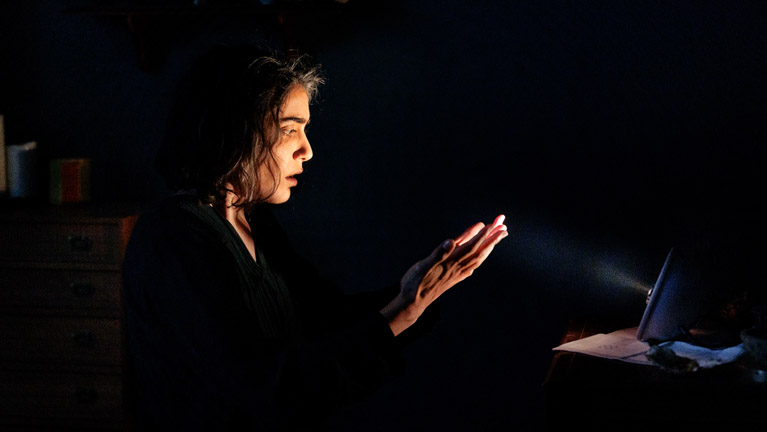
A film by Tom Tykwer
With: Lars Eidinger, Nicolette Krebitz, Tala Al Deen, Julius Gause, Elke Biesendorfer, Elyas Eldridge
A portrait of a modern family between collapse and new beginnings dealing with the big issues of our times, in a world that is reeling. Tim, Milena, their almost grown-up twins Frieda and Jon and their illegitimate son Dio – this is the Engels family, who seemingly have nothing left to hold them together when housekeeper Farrah enters their lives. The mysterious Syrian woman puts the Engels’ emotional world to an unexpectedly wild test.
Our rate: *
A resolutely bizarre film, assumed as such, pretentious, ambitious and haphazard, with no strong thread or guideline. We can speak of a genre with few targets (and rightly so), which could be called psychology fiction. Aspiring to confuse viewers and critics alike, hoping in this way that some of them will perceive some kind of genius in it, strongly surfing on fashions, at the crossroads between Christopher Nolan, a hint of Bergman (copying last year’s unexpected success at the Berlinale with Sterben – even borrowing its lead actor Lars Eidinger, which comes off honorably despite the general wreckage, but also the German cinema of the post-2005 years (the wave), a movement in which Tykwer was immediately involved with Run Lola Run, the film quickly loses itself almost from the start in its narrative and its twisted premise. Although it attempts to venture into a collective psychotherapy, going far beyond the family, it quickly loses its way, trying to say too much, to do too much on a poorly stitched subject, and above all in its moralistic, puerile, even naïve message (Tykwer didn’t come out of Matrix, in which he helped write the screenplay for certain parts). Politically hollow, even dubious (given the times), it engages in a curious exercise in detestation of Germany and its existential questioning, and seeks to oppose, with little success, the parents’ rational, Western-style approach (psychotherapy, good conscience) to a more mystical, Orientalist approach of the young Syrian maid, on the one hand, more evasive on the other, distinguishing the children from their parent. Dancing, drugs, virtual reality and incessant criticism of Germanness are the motifs tirelessly repeated – to the point of rapid disgust. Never adopting a provocative tone, never relying on intelligent observations or dialogue, but rather trying to give the impression that it does, as Nolan so often does (if you don’t get it, it’s probably because it’s beyond you, but don’t worry, it’s beyond the authors too), the film never manages to convince for more than five minutes, when at last a few maxims and aphorisms illuminate the mired stream of words, when at last – which in itself was a good idea – bright, sunny moments contrast with the incessant Berlin rain, symbolic in the extreme. But at the very end, another symbol appears, that of a shipwreck – echoing the prevailing fascist thinking on migratory submersion (sic)-, meant to awaken consciences, perhaps move or, on the contrary, disturb. This umpteenth cliché, far from activating our neurons, is taken at face value: the shipwreck in question is nothing more than that of a director who thinks he’s the genius he isn’t, who has nothing really interesting to tell us about our world, and whose point of view is ultimately particularly conformist – when he was thinking precisely the opposite.
